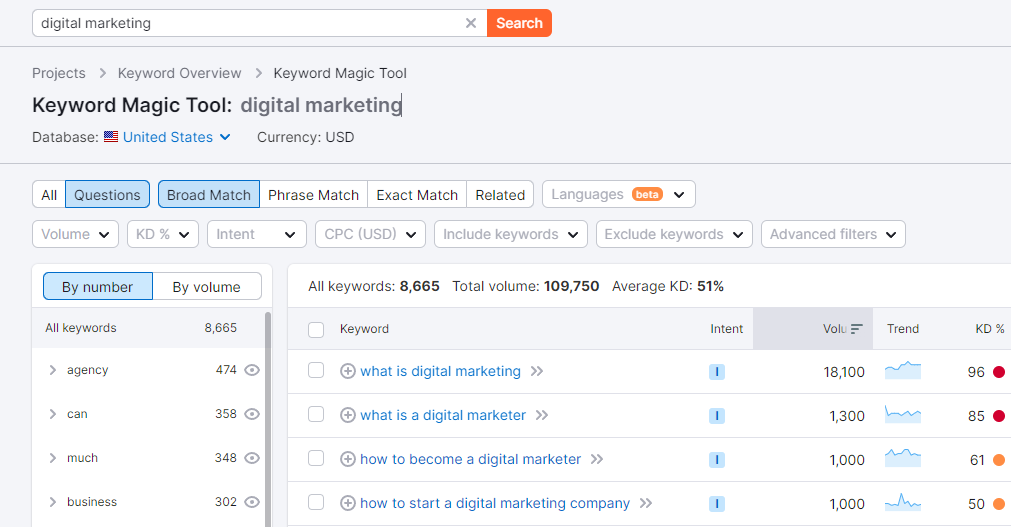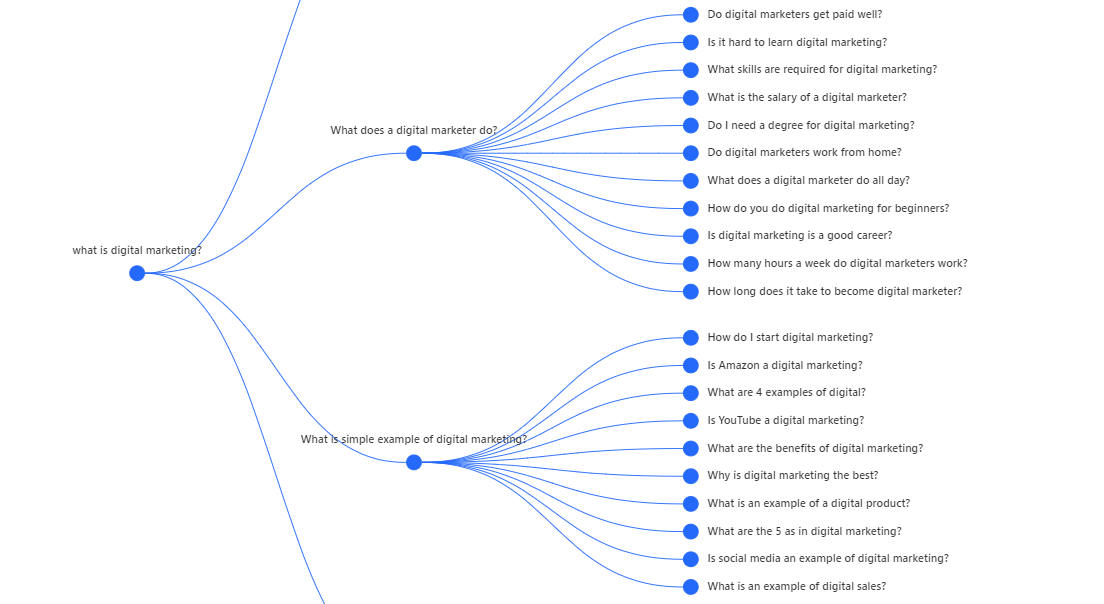
- +(305) 900-5905
- [email protected]
- Mon - Fri: 9:00 - 18:30

You can’t close a deal with your ideal clients if they can’t find you. That’s what makes SEO content writing such an essential aspect of your company’s digital marketing plan. By optimizing your website and content for search engines like Google, you can improve your website’s visibility, increase organic traffic, and fill up your sales pipeline. In this blog, we’ll explore industry-standard SEO content writing tips and how AI tools like ChatGPT can streamline the process of creating SEO-rich blogs.
The first step to crafting SEO content is research – what keywords do you want your website to rank for?
Understanding the keywords your website currently ranks for is a great place to start. Using SEO research tools like SEMRush gives you access to useful features like “Domain Overview” and “Organic Research,” which give you a list of the keywords that are present on your website and how strongly they’re impacting your ranking for relevant searches.
Once you have this information, you can strategically include these keywords in your existing and future content to boost your rankings.
This feature also allows you to analyze your competitors’ websites and determine what keywords they’re ranking well for. With this knowledge, you can either attempt to outperform them by utilizing the same keywords, or you can shift focus to keywords with less competition to occupy a different niche.
There are plenty of free alternatives for SEO research, like Spyfu, Ahrefs, Google Trends, Keyword Surfer, and Moz’s Keyword Explorer. These tools can help you discover trending keywords, assess keyword difficulty, and identify search volume, all of which can inform your SEO content writing.
With the research basis described above, you now have a list of keywords that you and your competitors are already utilizing, which can help you size up the competition and bolster your own SEO efforts already in place. Of course, you probably also want to expand your efforts into other relevant keywords as well. So where do you start? (Bear in mind we’ll keep using SEMRush as an example, but many SEO research tools offer similar capabilities.)
A valuable tool for researching new keywords is the “Keyword Magic Tool” by SEMRush. This feature lets you explore search queries that include specific keywords, including each keywords’ monthly volume and their “keyword difficulty (KD)”. These features outline how often the term is searched and how much competition there is to rank for each. Generic terms with high traffic generally have higher KD’s, meaning there’s a lot of competition and it will require an enormous effort to rank well for them, and highly specific terms will have lower KD’s and much less traffic. You’ll need to find a good balance with trafficked terms that don’t have an excess of competition – those middle-of-the-road terms could be your company’s new niche!

With the above research, you can easily begin crafting a list of SEO-friendly topics that you can flesh out into content for your website. By organically including the keywords you want to use (don’t overdo it!) in a blog or in your website’s copy, you can improve your website’s rankings for these subjects.
Websites like AlsoAsked also make the process of finding new keywords easier than ever. This resource provides a tree of queries related to your initial search term that users “also asked”, which can help you expand your SEO topic research.

No matter how far you take your research, you have a strong foundation to work from.
Understanding the search intent of your target audience is equally important in crafting SEO content. This can help you determine what the content will be about and how salesy you may or may not want to be, depending on the keyword. There are 4 main kinds of search intentions, and each of them requires a different writing approach:
You’ll have to use your own intuition to determine which of these intentions your audience has when searching certain terms. Consider speaking with your sales team to determine which questions customers have at each point in their buyer’s journey, or researching how your competitors are treating certain searches. For example, if a client is looking up, “What is life insurance?”, they likely just want to learn more about the subject and aren’t ready to buy. But if they look up “Best life insurance in my area,” they’re likely performing a transactional search.
AI-powered language models like ChatGPT have revolutionized the writing process by automating and accelerating various tasks. With AI assistance, processing research into a first draft of an SEO-rich blog has become faster and easier than ever before. ChatGPT can swiftly analyze the keyword research you performed and help you develop a coherent outline based on the data. It can suggest relevant headings, subheadings, and content sections to structure your blog effectively. By incorporating the identified keywords seamlessly, ChatGPT ensures that your content is SEO-friendly from the start.
Moreover, AI tools can assist in generating natural and engaging content that aligns with your SEO goals. ChatGPT’s ability to understand context and provide relevant information can make your content more informative and valuable to readers, which is crucial for SEO success.
While AI tools like ChatGPT significantly ease the content creation process, it’s essential to note that they still rely on the quality of input provided. To get the most valuable final product, you need to supply ChatGPT with accurate SEO research and guidelines. Additionally, AI-generated content requires manual proofreading and editing to ensure it aligns perfectly with your brand’s voice and message.
For businesses seeking seamless and reliable SEO copywriting solutions, 1GS Digital Agency is here to help. From conducting comprehensive SEO research to crafting compelling content, our team of SEO experts will ensure your website’s Google ranking increases noticeably month after month. By entrusting your SEO needs to 1GS Digital Agency, you can focus on growing your business while reaping the benefits of a robust online presence. Speak with a 1GS strategist today to learn more about your new SEO strategy.
Copyright ©️2023 1GS Digital Agency. All Rights Reserved
If you’re interested in scaling your agency, now’s your chance!